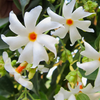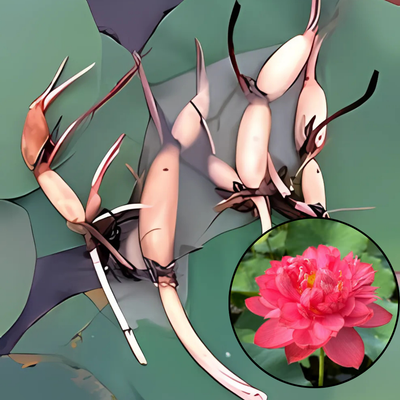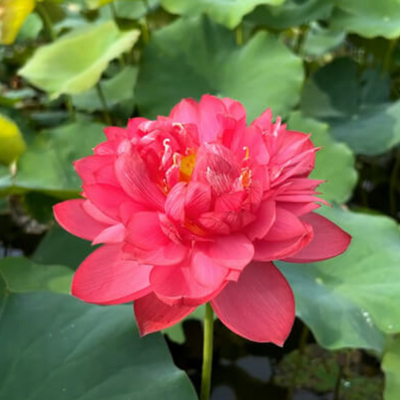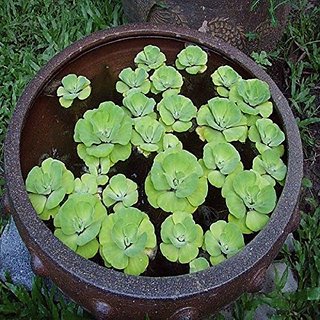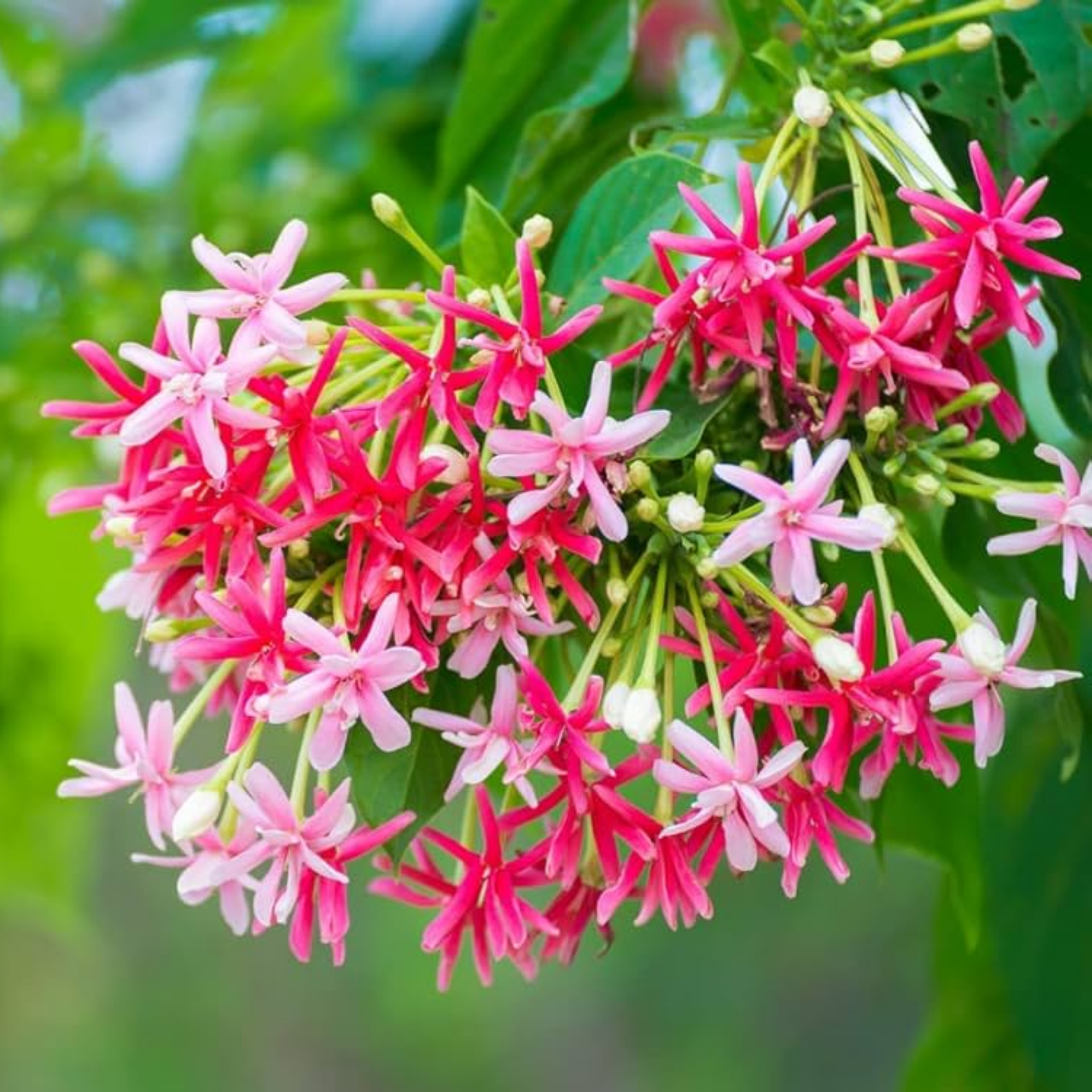
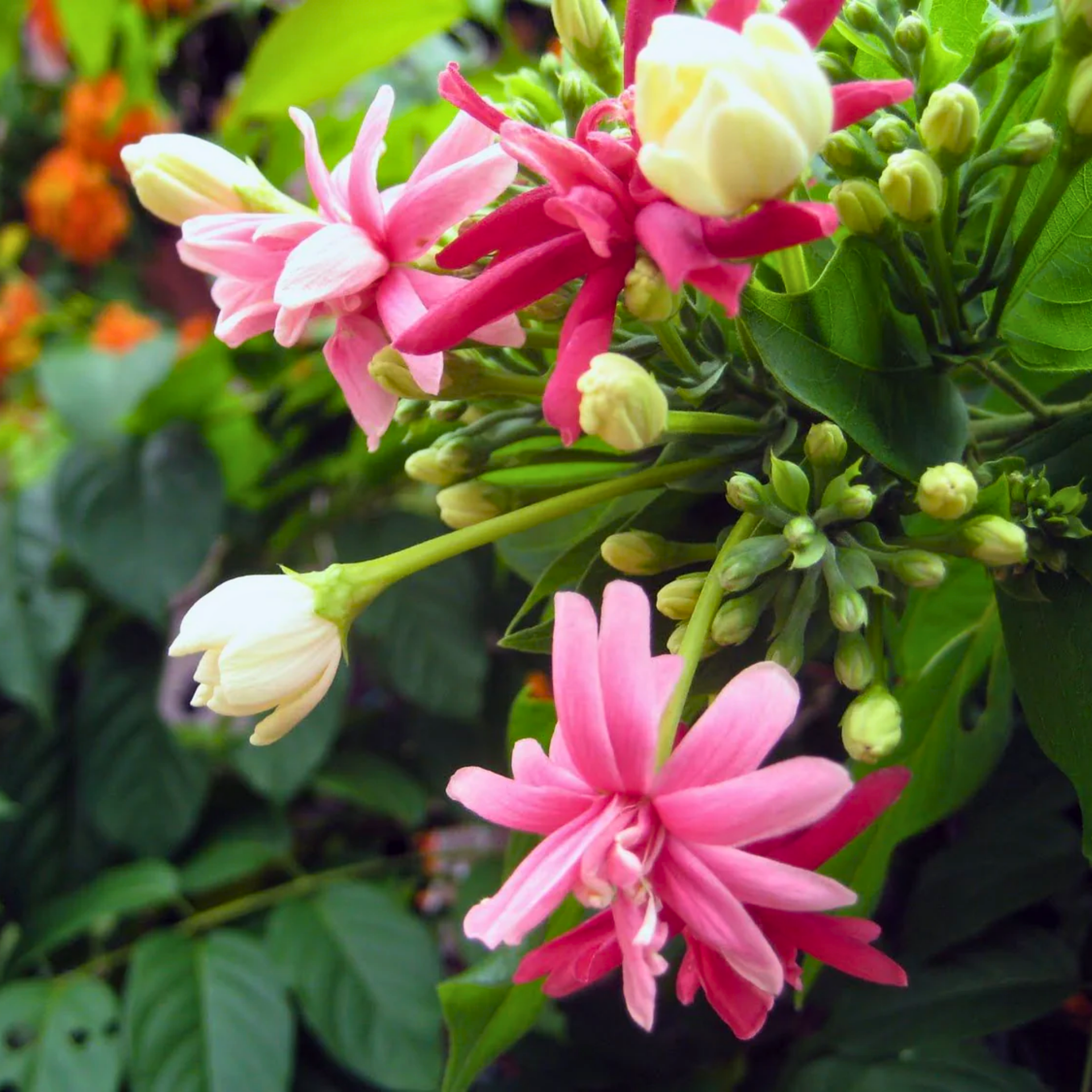
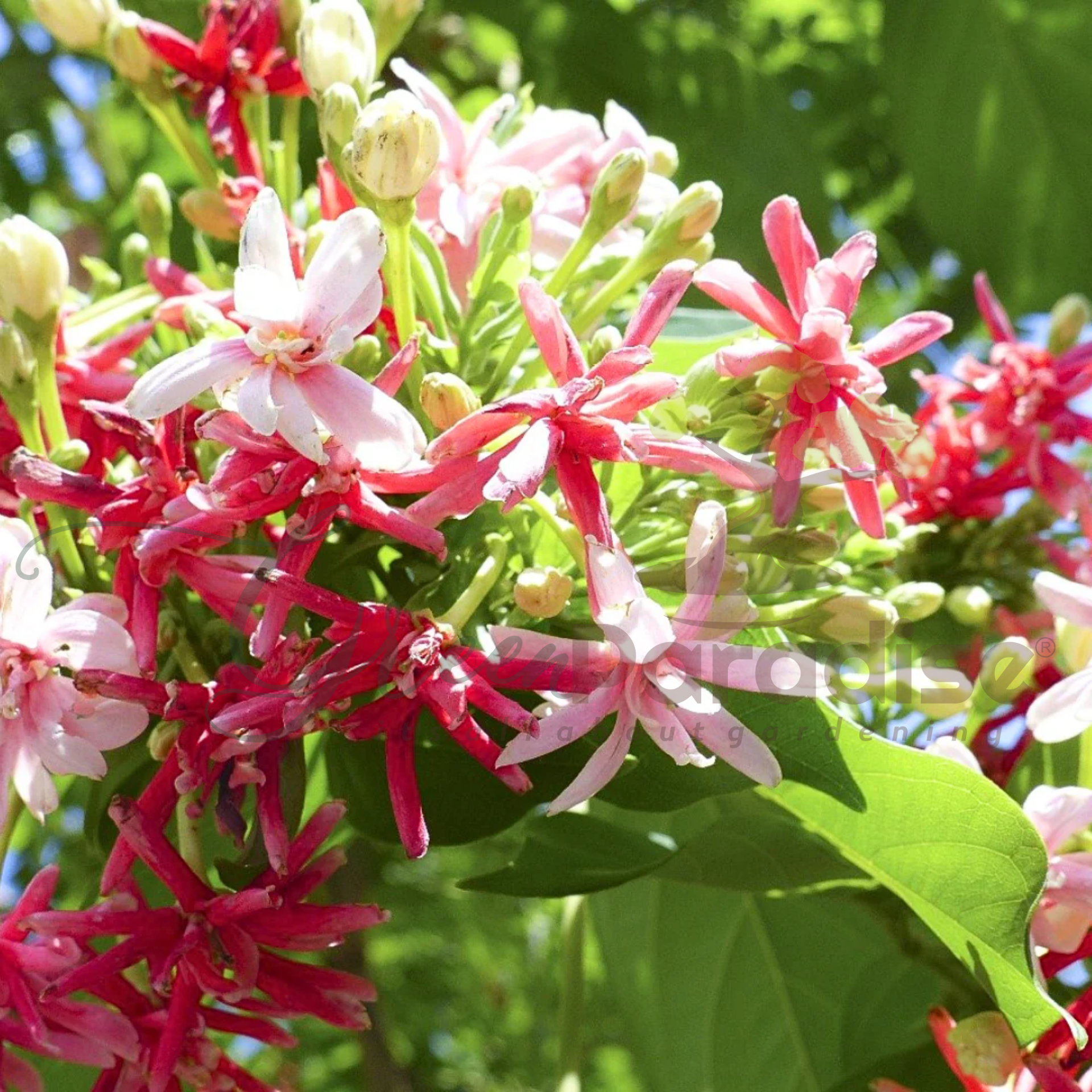
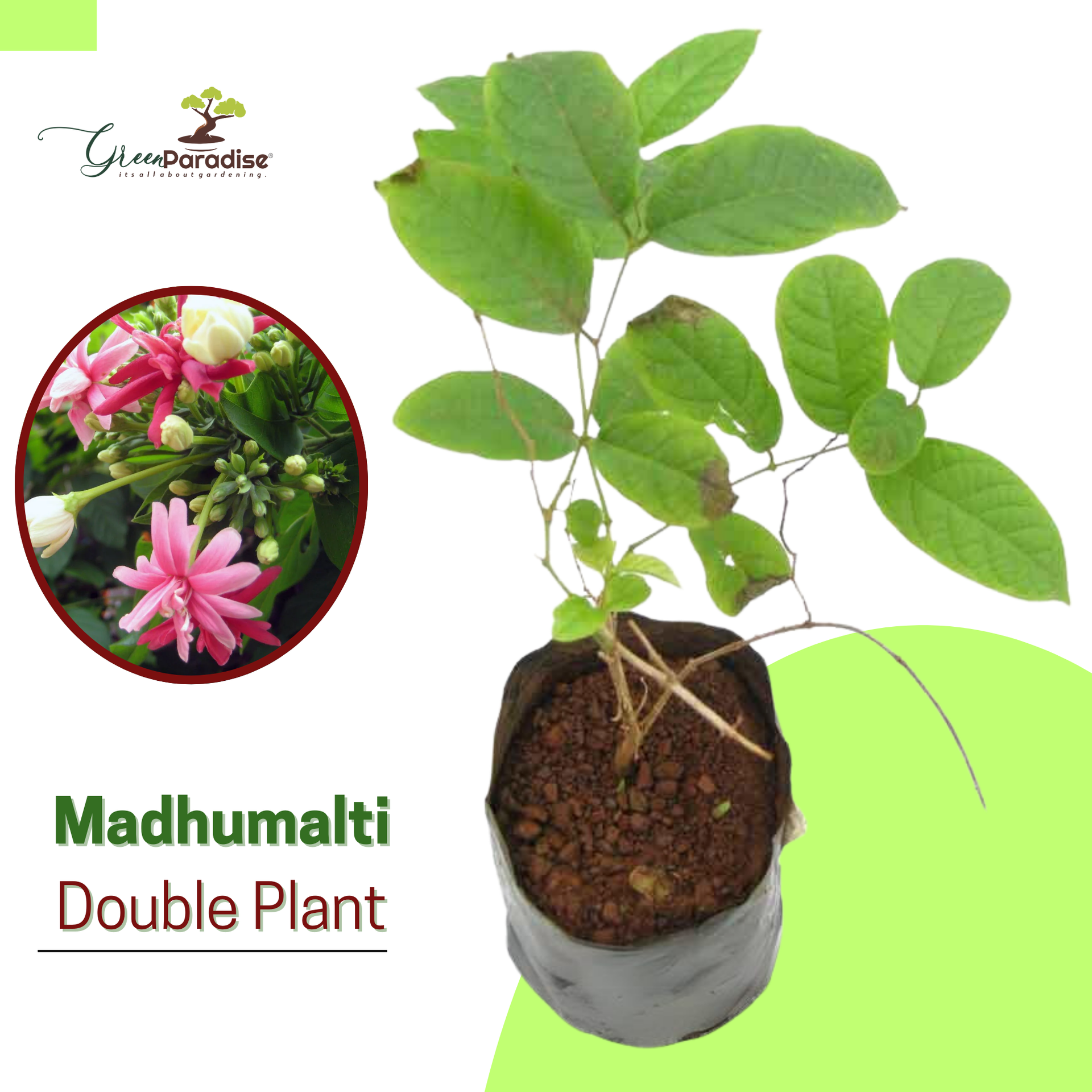
Madhumalati Rangoon Creeper Double Petal Plant
Guaranteed Safe Checkout
Green Paradise Offers Beautiful Madhumalti Double Petal Rangoon Creeper Plant
About Madhumalti Creeper
The Madhumalti Creeper with Double Petals, also known as Rangoon Creeper (Scientific name: Quisqualis indica), is a beautiful and fragrant flowering vine native to Southeast Asia. It belongs to the family Combretaceae and is a popular ornamental plant in many tropical and subtropical regions around the world.
The Madhumalti Creeper is known for its attractive and vibrant flowers, which change color as they mature. The flowers start as white or pale pink and gradually turn into shades of pink, red, and eventually deep maroon. This color-changing characteristic adds to its visual appeal. Each flower has five petals that are fused together at the base and form a tube-like structure.
The leaves of the Madhumalti Creeper are elliptical in shape, glossy, and dark green. They're arranged in a contrary pattern along the stems.
The plant produces long, flexible stems that can climb and sprawl, making it suitable for growing on trellises, fences, or as a ground cover.
One of the notable features of the Madhumalti Creeper is its fragrance. The flowers exude a sweet, intoxicating scent, especially during the evening and night, attracting pollinators like moths and butterflies. The fragrance is often described as reminiscent of jasmine or honeysuckle.
In terms of cultivation, the Madhumalti Creeper prefers a warm and sunny location. It thrives in well-draining soil with regular watering and benefits from occasional pruning to maintain its shape and encourage blooming. It's a fairly low- conservation factory formerly established.
The Madhumalti Creeper with Double Petal is highly regarded for its aesthetic value and is commonly used in landscaping and garden designs to create vertical accents, provide shade, or add a splash of color. Its ability to attract pollinators also makes it a valuable addition to butterfly gardens and wildlife habitats.
Overall, the Madhumalti Creeper with Double Petal is a delightful and visually striking plant with its color-changing flowers, fragrant blooms, and attractive foliage. It is a popular choice among gardeners and plant enthusiasts who appreciate its beauty and versatility.
Madhumalti Plant is a Special kind of flowering vine that change in color with age. Rangoon Creeper Botanical name, Combretum Indicum, is derived from the name of its genus, Combretum. The beautiful flower of the Rangoon Creeper plant has a divine fragrance, and its color varies from white to pink to red. This color changing the property of these flowers is considered a strategy to attract different pollinators. The leaves of Rangoon Creepers are elliptical with a rounded base with a green to yellow-green color. Butterflies And Honey Bees Love The Flowers. flowers Have Good Fragrance As Well.
How To Grow Madhumalti Creeper Double Petal
Care of Rangoon Creeper
The Madhumalti Creeper, also known as Rangoon Creeper or Double Petal Quisqualis, is a beautiful flowering vine that can add color and fragrance to your garden. Here are some general guidelines to help you grow Madhumalti Creeper with double petals:
Climate and Sunlight:
Madhumalti Creeper thrives in warm tropical and subtropical climates.
Choose a planting location that receives full to partial sunlight (at least 4-6 hours of direct sunlight per day).
Soil Preparation:
Ensure the soil is well-draining and fertile.
Add organic matter like compost or well-rotted ordure to ameliorate soil fertility and drainage.
Planting:
Select healthy double-petal variety plants from a reputable nursery or garden center.
Dig a hole slightly larger than the container size of the plant.
Place the factory in the hole and backfill with soil, indurate it gently around the roots.
Water the newly planted creeper thoroughly.
Watering:
Keep the soil constantly wettish but not doused, especially during the growing season.
Water deeply, allowing the water to access the root zone.
Reduce watering during cooler months or when the plant enters dormancy.
Fertilization:
Feed the Madhumalti Creeper with a balanced fertilizer during the growing season.
Use a slow-release fertilizer or apply a liquid fertilizer according to the package instructions.
Avoid over-fertilization, as it may promote excessive leaf growth at the expense of flower production.
Training and Support:
Provide a trellis, arbor, or other support structure for the creeper to climb.
Gently tie the vines to the support structure as they grow to encourage upward growth.
Pruning:
Prune the plant in late winter or early spring before new growth starts.
Remove any dead, damaged, or weak branches.
Pinch back the growing tips of the branches to promote bushier growth and more flowers.
Pests and Diseases:
Keep an eye out for common pests similar to aphids, mealybugs, and spider diminutives.
Treat pest infestations promptly with organic or chemical controls as necessary.
Monitor the plant for any signs of diseases like powdery mildew or leaf spots and take appropriate measures to address them.
Propagation:
Madhumalti Creeper can be propagated through stem cuttings.
Take 6-8 inch long cuttings from healthy, mature vines.
Remove the lower leaves and dip the cut end in a lodging hormone greasepaint.
Factory the slices in a well-draining replanting blend and keep them warm and wettish until roots develop.
Remember to consult local gardening resources or experts for specific advice tailored to your region's conditions. With proper care and attention, your Madhumalti Creeper with double petals should flourish and reward you with its beautiful blooms..
Very healthy plant
I purchased it on march 2025 from this site and today jun 2025 its blooming. Thanks for this genuine plant.
nice plant
when plant was arrived it wasnt that good, but now its growing and i will update ones it flowers
Happy

